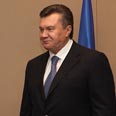
Ukrainian President Yanukovych party
צילום: יוסי זמיר
Anti-Semitic party gains strength in Ukraine
Ultra-nationalist Ukrainian Svoboda party sends shockwaves through political landscape as it passes political threshold with 12% of vote; party known for organizing marches against Hasidic Jews on pilgrimage, homosexuals and Russians
Ukrainian ultra-nationalist party Svoboda (Freedom) and its charismatic leader Oleg Tyagnybok were on course for their best result yet in national elections Sunday which could send shockwaves through the political landscape.
The party was set to win over 12% of the vote in parliamentary elections, the Democratic Initiative Foundation said in its exit poll, a result that would place Svoboda in third and give the party a strong position in the new parliament.
Related stories:
- Breslov Hasidim leave for Uman
- Jews make up less than 0.2% of mankind
- Jewish doctor murdered in Ukraine
Svoboda until now has only made waves in regional elections and its breakthrough into the Verkhovna Rada marks a major success for its hugely controversial policies which have drawn accusations of anti-Semitism and racism.
Tyagnybok, 43, known for his fiery speeches, appears to have broadened his appeal away from the fringe to a more mainstream electorate tired of voting for the same old personalities.
"Half its electorate are also still radical nationalists but the other half is largely a protest vote," said leading Ukrainian political analyst Volodymyr Fesenko.
"Svoboda is seen as the most radical and bold protest force," he said. Tyagnybok had won only 1.43 percent in the 2010 presidential elections.
Several voters questioned by AFP on election day said they had voted for Svoboda as a strong force against the rule of President Viktor Yanukovych, whose policies some see as anti-Ukrainian.
The party strongly emphasizes Ukraine's distinct cultural identity, regards the Soviet rule as an occupation of Ukrainian territory, scorns the Kremlin and plays up the importance of Ukrainian over Russian.
Its popular support is largely drawn from the Ukrainian-speaking west and the party is regarded with huge suspicion in the more pro-Russian east of the country.
But its foes focus on less palatable aspects of the party which include vehemently xenophobic rhetoric and the periodic rants of its leaders against Russians, homosexuals and Jews.
A pillar of the party's ideology is the glorification of the Ukrainian Insurgent Army (UPA) which fought against Soviet forces in World War II and whose offshoots continued anti-Soviet resistance right up into the 1950s.
Western historians accuse the UPA of collaborating with Nazi forces in World War II and also being complicit in the ethnic cleansing of Poles from what is now Ukrainian territory.
Svoboda was formed in 2004, growing out of a movement that until then had called itself the Social-National party of Ukraine.
In recent years it has attracted attention by being involved in clashes with pro-Russian demonstrators during commemorations for the Soviet World War II victory in May 2011.
The party also organized a march against the Hasidic Jews who arrive in thousands for a pilgrimage in Ukraine every year and opposed a singer of African origin representing Ukraine in this year's Eurovision Song Contest.
- Receive Ynetnews updates directly to your desktop










